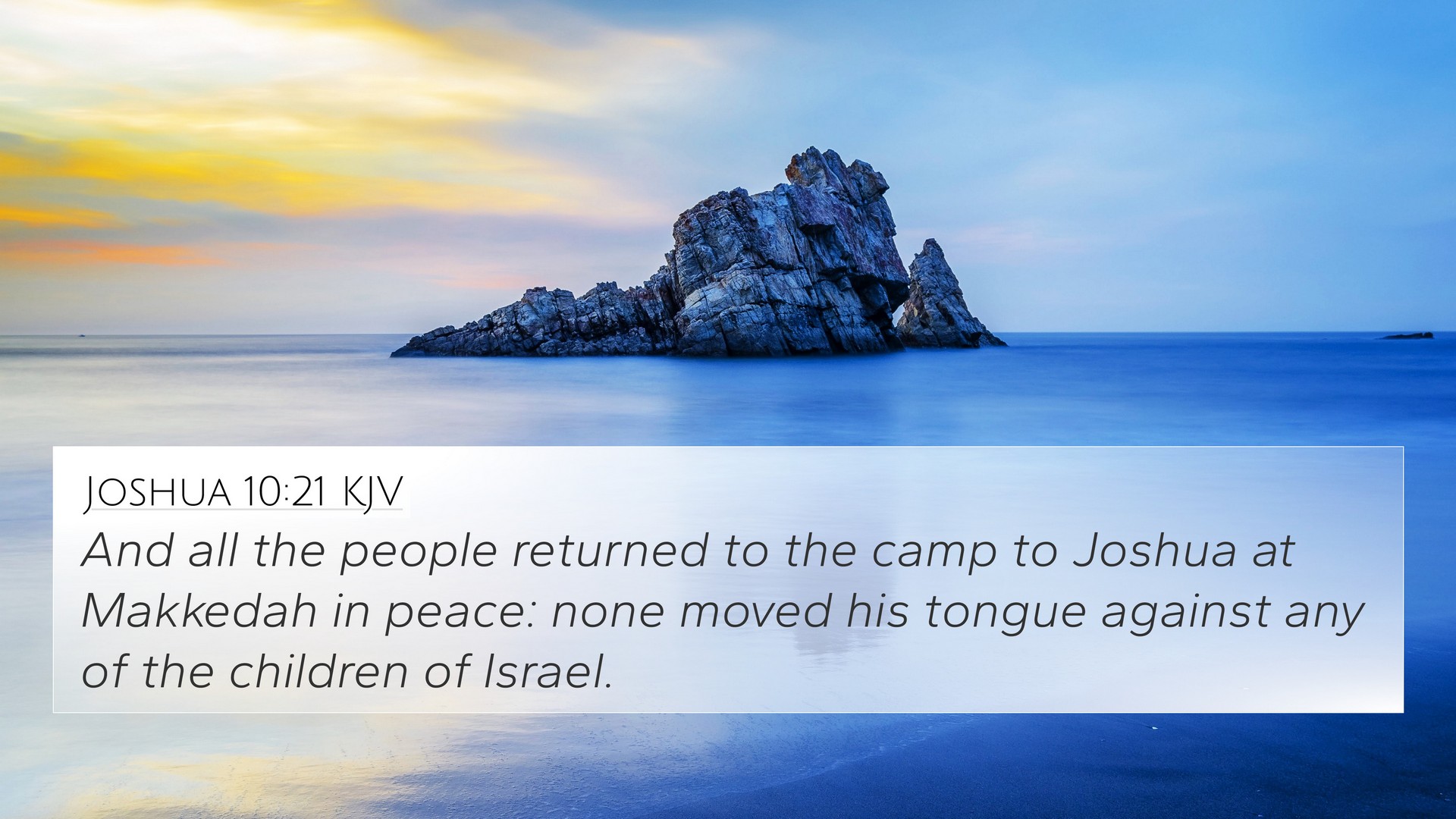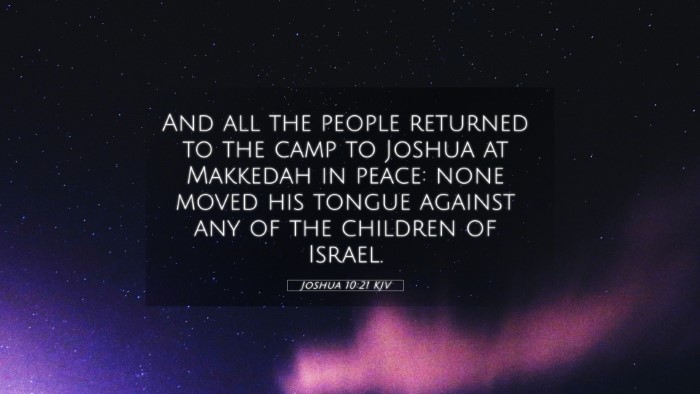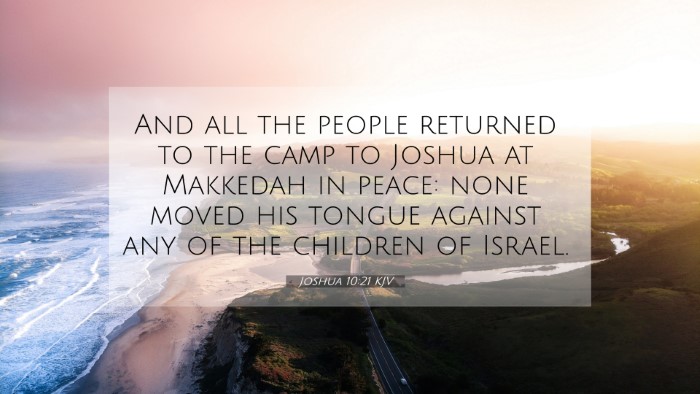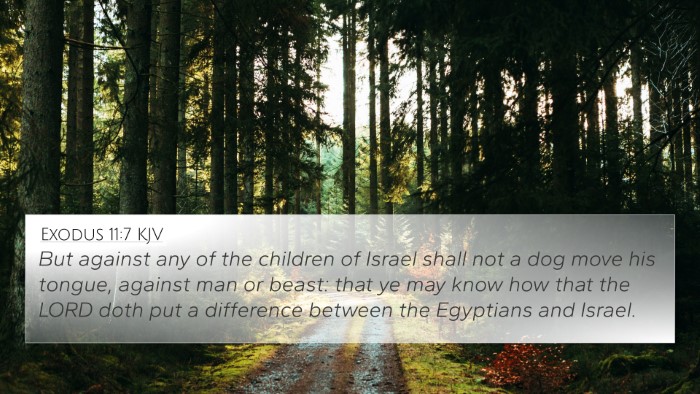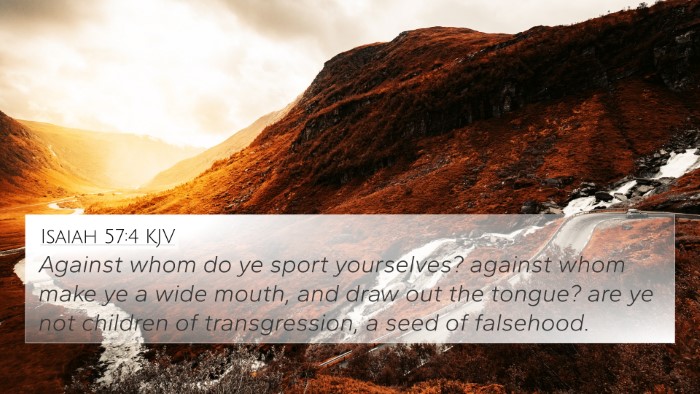Understanding Joshua 10:21
The verse from Joshua 10:21 states:
"And all the people returned to the camp to Joshua at Makkedah in peace: no one moved his tongue against any of the children of Israel."
This verse presents a profound moment of victory and the strategic significance of God's support in Israel's battles. Through the insights of public domain commentaries, we can uncover the deeper meanings and implications of this text.
Commentary Insights
Here’s a combined summary of the meanings derived from notable Bible commentaries:
- Matthew Henry: Joshua 10:21 illustrates the triumph of the Israelites over their foes. The absence of murmuring or dissent signifies the divine intervention that commanded respect and fear from the nations. It presents a moment where God's protection over Israel is made evident, as no one dared to speak against them after such a significant victory.
- Albert Barnes: Barnes emphasizes the importance of peace after battle. The return to the camp signifies not just physical safety, but spiritual assurance and divine favor. The silence of the enemies suggests their recognition of God’s power and their failure against His will, forecasting the ultimate success of Israel in the Promised Land.
- Adam Clarke: Clarke notes that this verse marks a critical juncture in Israel's campaign against the Amorites. The phrase "no one moved his tongue" indicates a complete halt in opposition, reflecting the fear instilled in their hearts due to the miraculous events of the preceding battle. Clarke points towards the psychological dimensions of warfare in a biblical context, where fear of the Lord leads to respect for His people.
Significance of Joshua 10:21
This verse emphasizes key themes, including:
- Divine Intervention: The role of God in Israel's victories showcases His support and protection.
- Peace in Victory: This peace reflects the absence of strife despite the surrounding conflicts; a hallmark of God’s favor.
- The Fear of God: The silence of Israel's opponents signifies a recognition of God's omnipotence.
Bible Cross-References
Joshua 10:21 can be explored further through various cross-references, which can enhance our understanding of the text:
- Exodus 14:14: "The Lord will fight for you; you need only to be still." - This verse highlights the concept of divine intervention in battles.
- Deuteronomy 31:8: "The Lord Himself goes before you and will be with you; He will never leave you nor forsake you." - This denotes God’s continual support for His people.
- Psalm 44:3: "For they did not gain possession of the land by their own sword, nor did their own arm save them; but it was Your right hand, Your arm, and the light of Your countenance, because You favored them." - Reflecting on God’s favor over His people.
- Isaiah 54:17: "No weapon formed against you shall prosper." - An assurance of safety against opposition, similar to the Israelites' experience.
- Romans 8:31: "If God is for us, who can be against us?" - This New Testament echo emphasizes God's protection, linking Old Testament victories with New Testament assurance.
- Joshua 1:9: "Have I not commanded you? Be strong and courageous. Do not be frightened, and do not be dismayed, for the Lord your God is with you wherever you go." - Encouragement of confidence in God’s presence during challenges.
- Hebrews 11:30: "By faith the walls of Jericho fell down after they were encircled for seven days." - This verse relates to the theme of faith leading to victory in battles.
Connections Between Bible Verses
Establishing connections between Joshua 10:21 and other scriptures allows for a thematic exploration of divine victory and protection:
- Old Testament Narrative: The continuity of God's power is seen from Exodus through the Kings, with repeated affirmations of Israel's vulnerability without God.
- New Testament Assurance: The comparison of Old Testament victories to the peace believers have in Christ shows a deeper theological connection, reinforcing that God remains active in guiding His people.
Linking Bible Scriptures
Linking this verse to others enriches the understanding of Biblical themes:
- Conflict and Resolution: Through cross-referencing verses, we can see how conflicts often precede resolutions granted by God.
- The Role of Faith: Numerous passages indicate how faith leads to God’s intervention, a recurring motif demonstrated in Joshua's leadership.
Tools for Bible Cross-Referencing
For those eager to delve deeper, several tools and methods can enhance your studies:
- Utilizing a Bible Concordance to identify related terms and themes.
- Employing a Cross-Reference Bible Study Guide for thematic exploration.
- Understanding the Cross-Reference Bible Study Methods enables an efficient study of how verses interlink.
Conclusion
Joshua 10:21 encapsulates a critical moment in the journey of Israel, linking numerous verses across the canon that demonstrate God’s ongoing relationship with His people. The practice of cross-referencing Biblical texts serves not only to deepen one's understanding of individual verses but also reveals the holistic narrative of Scripture that emphasizes faith, divine intervention, and ultimate victory through God’s grace.
